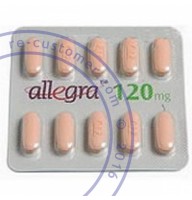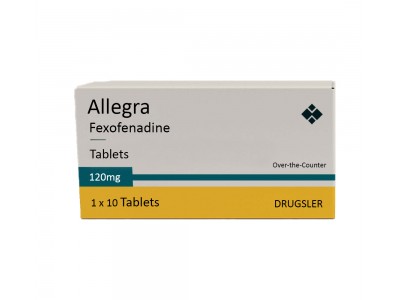What to Tell Your Healthcare Provider Before Taking Allegra (Fexofenadine)
When considering taking Allegra (Fexofenadine), there are several important factors to discuss with your healthcare provider to ensure the medication is safe for you. Allegra is an antihistamine commonly used for treating allergy symptoms, but as with any medication, it's essential to provide your doctor with the necessary information to avoid potential risks or complications. Below, we discuss key points to bring up during your visit to your healthcare provider.
1. Allegra Fexofenadine Dosage
The proper Allegra Fexofenadine dosage will depend on factors such as your age, medical history, and the specific allergy symptoms you are experiencing. It is essential to inform your doctor about your current health conditions and any medications you may already be taking. Your healthcare provider will use this information to recommend the most appropriate dosage of Allegra for your needs.
2. Side Effects of Allegra Fexofenadine
While Allegra is generally well-tolerated, it is important to be aware of the side effects of Allegra Fexofenadine that may occur. These can include headaches, dizziness, dry mouth, and drowsiness, though the latter is less common compared to older antihistamines. Make sure your healthcare provider knows if you have experienced any adverse reactions to similar medications in the past. This will help them determine whether Allegra is the right choice for you.
3. Allegra and Drug Interactions
Many medications can interact with Allegra and drug interactions may occur. For example, certain antibiotics, antifungal medications, or even antacids can affect the way Fexofenadine works in your body. Inform your doctor about any prescriptions, over-the-counter medications, or supplements you are currently taking to avoid harmful interactions. Your healthcare provider may adjust your treatment plan accordingly to ensure safety.
4. Fexofenadine Safety Information
Your healthcare provider should also be aware of any existing medical conditions you may have before prescribing Fexofenadine safety information. If you have a history of kidney problems or heart issues, your doctor may advise against taking Allegra or monitor you more closely. Ensure that you share a comprehensive list of your health concerns, including any allergies you may have to medications.
5. Allegra Fexofenadine Precautions
There are some Allegra Fexofenadine precautions that you should follow. For instance, Allegra should be taken on an empty stomach, at least one hour before or two hours after a meal. This ensures the best absorption of the drug into your system. Always follow your healthcare provider's instructions about how and when to take Allegra to maximize its effectiveness.
6. Allegra Fexofenadine Allergy Information
If you have a known allergy to Fexofenadine or other antihistamines, it is crucial to inform your healthcare provider. Allegra Fexofenadine allergy information will help your doctor decide if a different treatment is needed. It's always best to be honest about your allergies to avoid any unnecessary risks associated with your medication.
7. Fexofenadine Contraindications
Before starting treatment, be sure to discuss any Fexofenadine contraindications with your healthcare provider. Certain health conditions or medications may make Allegra unsafe for you. For example, individuals with severe renal impairment or certain heart conditions may need to avoid this medication or be carefully monitored. Sharing your complete health history can help your doctor determine whether Allegra is suitable for you.
8. Taking Allegra with Other Medications
Some medications may interfere with the way Allegra works, so it's important to talk about taking Allegra with other medications. For example, antacids containing aluminum or magnesium can reduce the absorption of Fexofenadine, making it less effective. Let your healthcare provider know if you are taking any other treatments for allergies, colds, or other conditions that could affect the efficacy of Allegra.
9. Allegra Fexofenadine for Pregnancy
Pregnancy is another factor that your healthcare provider will consider when prescribing Allegra. There are limited studies on the safety of Allegra Fexofenadine for pregnancy, so it is essential to consult your doctor if you are pregnant, planning to become pregnant, or breastfeeding. Your healthcare provider will weigh the potential benefits and risks to determine the best course of action.
10. Allegra Fexofenadine and Alcohol
Finally, it is important to be cautious about Allegra Fexofenadine and alcohol. Although Allegra is less sedating than older antihistamines, combining it with alcohol can increase the likelihood of side effects such as drowsiness or dizziness. Always ask your healthcare provider if consuming alcohol while taking Allegra is safe in your case, as it may need to be avoided for your well-being.
In conclusion, providing your healthcare provider with accurate and complete information is vital to ensuring safe use of Allegra (Fexofenadine). By discussing these important points, you can help your doctor make informed decisions and reduce the risk of potential side effects, drug interactions, or complications. Always follow your doctor’s instructions and never hesitate to ask questions about your treatment.

